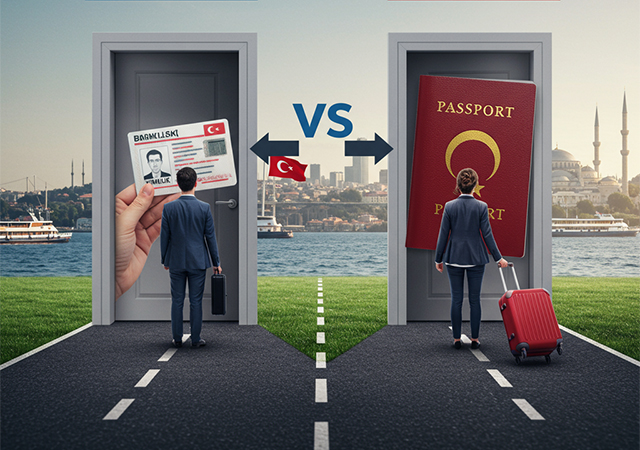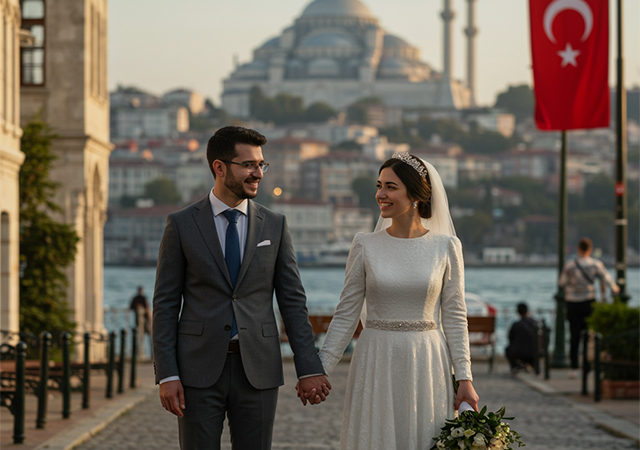Huzur mahallesi Azerbaycan caddesi No:4 skyland İstanbul A Blok 26.kat Daire:580 Sarıyer/İstanbul
Migrating to Turkey in 2025: A Comprehensive Guide to Residency and Citizenship

The decision to immigrate is one of life's most significant choices, and with its cultural and economic appeal, Turkey has become a top destination for many. But is this country truly the right fit for you? This guide, without lengthy introductions, provides a practical and realistic roadmap for migrating to Turkey in 2025, helping you make an informed decision.
Initial Assessment; Is Turkey Right for You?
Before taking any steps, you must weigh the advantages and challenges of living in Turkey.
- Main Attractions: Geographical and cultural proximity, lower living costs compared to European countries, excellent opportunities for property investment and obtaining citizenship through it, and a reputable education system are among the primary reasons for Turkey's popularity.
- Key Challenges: Economic fluctuations and inflation in recent years, the Turkish language barrier for entering the job market, and the complexities of immigration laws that are constantly changing are major challenges.
To begin any process, having a passport with at least 6 months of validity, a clean criminal record, and proof of initial financial means is mandatory.
What Is Your Goal? Residency (Kimlik) vs. Citizenship (Passport)

Understanding the difference between these two concepts will define your path:
-
Residence Permit Card (Kimlik): This card allows you to live legally, open a bank account, and enroll your children in school. However, it has limitations; for example, with a tourist or property-based residency (valued at less than $400,000), you are not permitted to work, and you must renew it periodically.
- Citizenship and a Turkish Passport: By obtaining citizenship, you become a Turkish citizen with full rights, including the right to vote, the right to work without needing a permit, and most importantly, a powerful passport for visa-free travel to over 110 countries.
The Main Pathways to Migration
After setting your goal, you must choose the best path to achieve it.
1. Migration through Investment (The Fastest Route)

This is the most popular and quickest way to attain permanent residency and citizenship.
-
Property Purchase:
- For Residency: By purchasing a residential property worth at least $200,000 in permitted cities, you can obtain a renewable residence permit. With this type of residency, you are not allowed to rent out your property.
- For Citizenship: By purchasing a property or a set of properties worth at least $400,000 and committing not to sell it for 3 years, you can obtain citizenship and a Turkish passport for yourself, your spouse, and children under 18 within 3 to 6 months. With this method, you are allowed to rent out the property.
-
Other Investment Methods (for Citizenship):
- Bank Deposit: Depositing $500,000 in a Turkish bank and maintaining it for 3 years.
- Company Registration: Establishing a business and employing at least 50 Turkish citizens.
2. Work-Based Migration (The Path of Specialization and Employment)

If you have a specialization, work-based migration is a logical option. The main prerequisite is receiving a Job Offer from a Turkish employer. The employer must apply for a Work Permit (Çalışma İzni) on your behalf. Fluency in Turkish significantly increases your chances. After 5 years of legal work and paying taxes and insurance, you can apply for Turkish citizenship.
3. Educational Migration (The Path of Knowledge and Future)

Turkish universities are globally recognized and are part of the Bologna Process (aligned with European universities).
- Public Universities: Admission is through entrance exams like YÖS (for various fields) and SAT (mostly for international programs). Tuitions are very affordable.
- Private Universities: Admission is based on GPA and does not require an entrance exam, but tuitions are significantly higher.
Students receive a student residence permit and are allowed to work part-time. This is one of the most cost-effective ways to enter and live in Turkey.
4. Migration through Marriage

Marrying a Turkish citizen can lead to citizenship, provided that the marriage is proven to be genuine and the couple has lived together for at least 3 years.
High-Risk Methods to Avoid
-
Tourist Residency via Renting: Under the new 2025 regulations, this method is nearly impossible for first-time applicants, and its renewal comes with a high risk of rejection. Do not consider this a secure path for migration.
- Asylum and Illegal Migration: These paths, aside from life-threatening and financial risks, carry severe consequences such as detention, deportation, and a permanent ban from entering Turkey.
Cost Estimation; From Migration to Daily Life
Financial planning is the most critical part of migration.
-
Initial Costs: These vary depending on your chosen method; from a few hundred dollars in administrative fees for student residency to the $200,000 or $400,000 investment for property. Also, consider ancillary costs like document translation, health insurance (approx. $100-$300 per year), and flight tickets.
-
Monthly Living Costs: Costs depend on your city and lifestyle.
| Expense (Monthly Estimate for One Person) | Istanbul | Ankara | Izmir |
|---|---|---|---|
| 1-BR Apartment Rent (City Center) | $600 - $1,000 | $400 - $700 | $450 - $750 |
| Utilities (Electricity, Water, Gas, Internet) | $80 - $120 | $70 - $110 | $75 - $115 |
| Groceries & Food | $250 - $400 | $200 - $350 | $220 - $380 |
| Public Transportation | $50 - $70 | $40 - $60 | $45 - $65 |
| Total Estimated (USD) | $980 - $1,590 | $710 - $1,220 | $790 - $1,310 |
Note: These figures are estimates and can vary based on the exchange rate and inflation in 2025.
Life in Turkey; Culture and Choosing a City
- Cultural Adaptation: Turkish people are generally hospitable, but learning even basic Turkish will earn their respect and make your integration process much smoother.
- Choosing a City:
- Istanbul: The bustling economic and cultural heart; full of job opportunities but expensive and crowded.
- Ankara: The political capital; a calmer, more organized city suitable for family life.
- Izmir: The pearl of the Aegean; a modern city with a European lifestyle and great weather.
- Antalya: The tourist hub; ideal for those seeking tranquility and a life by the sea.
Your Practical Roadmap
- Assess and Choose: Evaluate your financial, educational, and professional situation and select the best method.
- Prepare Documents: Get all necessary documents (passport, birth certificate, diplomas, etc.) officially translated and, if required, apostilled.
- Apply and Travel: Apply for your chosen method (e.g., purchase property or gain university admission) and travel to Turkey.
- Apply for Residency: Immediately upon arrival, book an appointment (randevu) through the online system of the immigration authority to apply for your residence permit card (Kimlik).
Conclusion and Final Step
Migrating to Turkey in 2025 remains an attractive option, provided it is done with full awareness and careful planning. Investment paths through property purchase are the fastest and most reliable ways to citizenship, while educational and work-based routes are logical options for entering the country with a lower initial cost.
Immigration laws are complex and constantly changing. A small mistake can lead to a significant waste of time and money. To ensure you navigate all steps correctly and with knowledge of the latest regulations, seeking advice from a specialized and reputable legal team in Turkey is a smart investment in your future.
For expert advice and assistance throughout all legal stages of migration, from property purchase to obtaining citizenship, you can visit istanbullawyer.info and connect with experienced lawyers.
Frequently Asked Questions (FAQ)
1. Is a military service completion card required to migrate to Turkey?
2. Is it possible to migrate to Turkey without a Turkish language certificate?
3. What is the most cost-effective way to migrate to Turkey?
4. How long does the process of obtaining residency or citizenship take?
The timeline varies significantly depending on your chosen method:
- Residency (Kimlik): After submitting your documents at the appointment (randevu), it usually takes 30 to 90 days to receive your residence card.
- Citizenship by Investment: This is the fastest route. The entire process, from property purchase to receiving the passport, typically takes 3 to 6 months.
- Citizenship by Work or Marriage: These paths are longer, requiring several years of legal residency (5 years for work, 3 for marriage) before you can apply. The citizenship application review process itself can take another 1-2 years.







